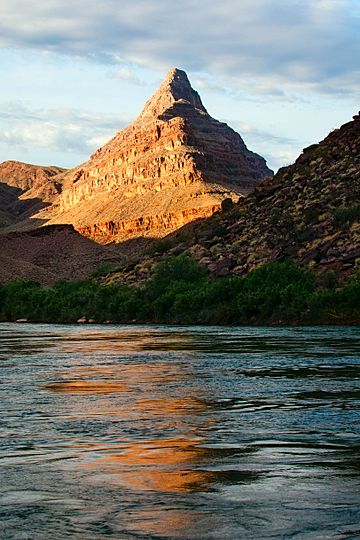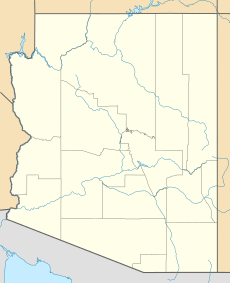Diamond Peak (Arizona) facts for kids
Quick facts for kids Diamond Peak |
|
|---|---|

North aspect, from the Colorado River
|
|
| Highest point | |
| Elevation | 3,512 ft (1,070 m) |
| Prominence | 852 ft (260 m) |
| Isolation | 1.52 mi (2.45 km) |
| Geography | |
| Location | Hualapai Indian Reservation Mohave County, Arizona, US |
| Parent range | Colorado Plateau |
| Topo map | USGS Diamond Peak |
| Type of rock | limestone |
| Climbing | |
| First ascent | May 14, 1967 by Harvey Butchart, Reider Peterson |
Diamond Peak is a tall mountain in the western part of the Grand Canyon. It stands 3,512 feet (1,070 meters) high. This peak is located in Mohave County, Arizona, within the Hualapai Indian Reservation.
Diamond Peak has two main tops, making it a "double summit." It sits right where Peach Springs Canyon meets the Colorado River. The mountain is made of old rocks called limestone. It rises very steeply, about 2,200 feet above the Colorado River in just half a mile! The area around Diamond Peak has a desert climate.
Contents
Exploring Diamond Peak's Past
Early Explorers and Names
In 1858, a man named Lieutenant Joseph Ives led a trip up the Colorado River. He used a steamboat called Explorer. The boat hit a big rock, now called Explorer's Rock, and got damaged.
After the boat was damaged, Ives and his team continued their journey on land. Hualapai guides helped them explore the Grand Canyon through Peach Springs Canyon. On April 5, 1858, they camped near Diamond Creek. They were the first known European Americans to reach the Colorado River in that part of the Grand Canyon.
How Diamond Peak Got Its Name
John Strong Newberry was a geologist with Ives' expedition. He was the first geologist to see the Grand Canyon. Newberry wrote about the different rock layers and fossils he found. Ives and Newberry were the ones who named Diamond Peak and Diamond Creek.
A Surprising Prediction
Joseph Ives wrote a report about his trip. He said the Grand Canyon was a "vast ruin" with huge canyons and tall spires. He also wrote that the area was "altogether valueless." He thought his group would be the first and last white people to visit this "profitless locality."
Ives believed the Colorado River would "forever be unvisited and undisturbed." But history proved him wrong! Today, many people visit the Grand Canyon.
Diamond Peak for River Rafting
People love to go rafting on the Colorado River through the Grand Canyon. Many rafting trips end at Diamond Peak. There's a beach at Diamond Creek and a road that makes it easy to leave the lower Grand Canyon.
Diamond Peak is a landmark that tells rafters they are near the exit point. It's located at river mile 225. This means it's 225 miles from Lees Ferry, where most rafting adventures begin.
Gallery
Images for kids
 | Jewel Prestage |
 | Ella Baker |
 | Fannie Lou Hamer |









